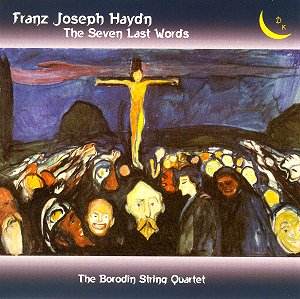Haydn was a devout
Catholic and inscribed his scores with
prayers, so this musical masterpiece
was undoubtedly suffused with the most
sincere devotional feeling. It was commissioned
by Cathedral of Cadiz, Spain and Hungary
being equally provinces of the Habsburg
Empire at that time. The seven "words"
are actually seven sentences from the
gospel texts reportedly spoken by Jesus
when he was on the cross, crucifixion
being in effect death by thirst and
thus taking up to three very unpleasant
days. In the notes each "word"
is elaborately analysed in terms of
the religious significance of the last
hours of Jesus’ life. It was originally
intended that it be recited before each
of the adagio movements as appropriate
(this and all modern quartet performances
I am aware of omit the recitation).
As I am not a Christian, and as the
performers were at least officially
atheists, I can appreciate this performance
as brilliant music for four strings
written on a dramatic subject. I can
imagine an entirely different performance
by four severely devout performers,
particularly Italian performers, and
if you view this music as primarily
a religious document, you may prefer
to look elsewhere.
The end is a suitably
dramatic flourish but the drama builds
steadily in intensity, with some surprisingly
calm, even pretty, interludes. To our
modern ears this sounds like completely
abstract music, but to the audience
of its day, the music was perceived
to follow the text almost word by word.
It is my understanding that to a Christian
the Crucifixion is an occasion of mixed
joy as well as tragedy, for it marks
the beginning of victory over evil,
and in any event, one would be presumptuous
to challenge the depth of Haydn’s legendary
piety, as Mendelssohn did. Haydn wrote
this work originally for string orchestra,
but in view of its immediate popularity
arranged it for quartet as heard here
and also for keyboard. Eventually he
arranged it, with additional words by
Von Swieten, clarinets and trombones,
and one additional instrumental largo,
as an oratorio for chorus and orchestra.
This is a live recording
made in Moscow, apparently during a
bronchitis epidemic, and early on somebody
slams a door. But the curative powers
of the music are here strongly demonstrated
because by a third of the way through
most of those present are breathing
silently. Their applause at the end
is both respectful and fervent and shows
that this was truly a very large audience.
This is the "new"
Borodin quartet, with replacements for
the original violinists Rostislav Dubinsky
and Yaroslav Alexandrov after they had
emigrated to the west in 1976, Dubinsky
eventually to form the Borodin Trio.
The "old" Borodin quartet
was capable of the most stunningly dramatic,
"symphonic" performances,
and in this recording the "new"
quartet shows itself equal to the ability
of its predecessor. Although one’s attention
is throughout focused on the dramatic
musicality of this performance, after
several hearings one begins to notice
and appreciate the astonishing precision
and ensemble, as though a single person
were playing.
Paul Shoemaker


